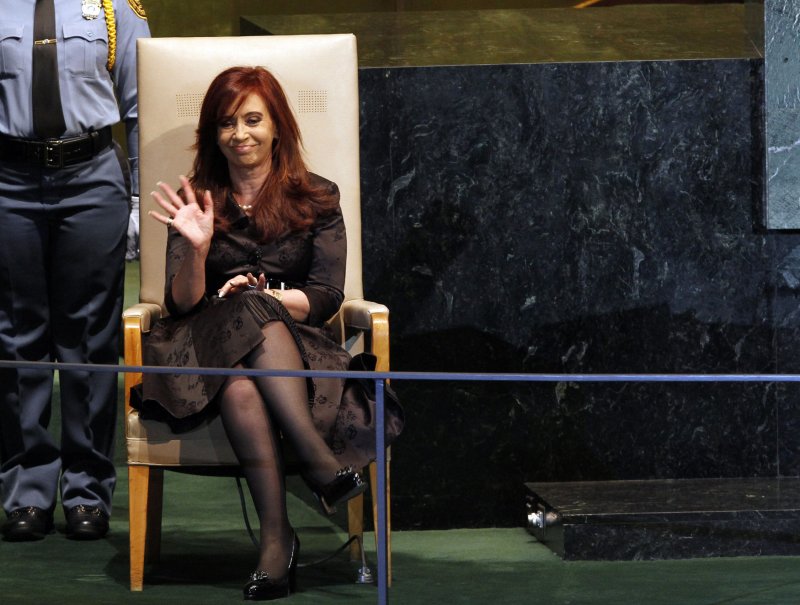Cristina Fernandez President of Argentina. File photo. UPI/John Angelillo |
License Photo
SANTIAGO, Chile, Oct. 7 (UPI) -- A simmering row over conflicting attitudes to past military abusers of human rights in Chile and Argentina threatens to get out of control as another Argentine fugitive faced expulsion from Chile after sudden arrest.
Former Argentine Col. Alejandro Duret was seized in central Chile's Maule region and ordered sent back to Argentina within hours of arrest. Duret was found in the town of Talca after a cross-border hunt that followed his escape from Argentina hours before he was to face renewed charges for the disappearance of a political opponent in 1976.
The quick resolution of the fugitive's flight from justice contrasted with several unresolved cases that have pitted Chilean and Argentine authorities against each other in disputes over the handover of prisoners and suspects and complex extradition deals.
Duret was sentenced to 15 years in an Argentine prison for the disappearance of a political opponent in 1976. In July 2009 he won a reprieve when an Argentine court acquitted him of the charges. But the campaign to secure his conviction continued and in September the Chamber of Criminal Appeals overturned his acquittal.
However, the day before the ruling, Duret fled to Chile using a tourist visa to gain entry through a mountainous border crossing.
Duret's escape was a politically charged embarrassment for Argentine President Cristina Fernandez because Fernandez and her late husband, former Argentine President Nestor Kirchner, knew Duret's victim, Carlos Labolita, while they studied at the National University of La Plata.
Prosecutors alleged Duret was complicit in the kidnapping and arrest, torture and eventual disappearance of Labolita.
With Fernandez widely tipped to win the Oct. 23 presidential election, the Argentine leader is keen to avoid embarrassing references to the past and to appear to be strong in dealing with incidents invoking the country's dark past under military dictatorship.
Chile, too, is keen to be seen handing out punishments to members of past military regimes suspected of human rights abuses.
But dealing with human rights abusers evading justice in the two countries is proving to be complicated. Alleged abusers as well as former convicts fleeing justice in their native country are known to be hiding in both countries and, in many cases, successfully evading justice thanks to alleged connivance of old allies and friends in high places.
In another notorious case, former Argentine Judge Otillo Romano sought refuge in Chile after he faced charges of hundreds of human rights abuses. Chile is under pressure to give him up or to decide his future status as a refugee.
Meanwhile, Argentina has faced charges of provocative decisions that threaten to under relations between the two countries. Former Chilean guerrilla activist Galvarino Apablaza was wanted by Santiago prosecutors but Fernandez granted him refugee status. Apablaza is wanted for the 1991 assassination of Sen. Jaime Guzman Errazuriz, a chief adviser to Chile's military dictatorship that lasted from 1973 to 1990. However, Fernandez turned down a Chilean request to hand him over.
Chilean government officials also ruled out a more regularized exchange of prisoners, including extradition of human rights convicts wanted by each other, The Santiago Times reported.





